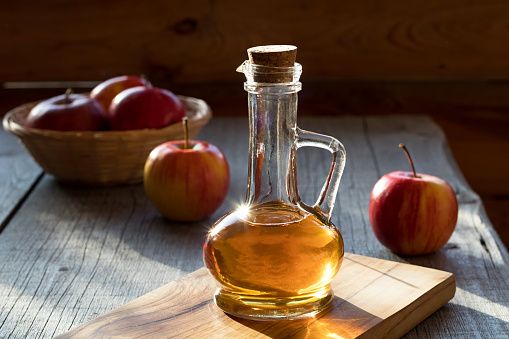Apple Cider Vinegar-Health Benefits And Precautions
Note: Friends, if you are comfortable in reading this article in any other language, please change the language from the translate button on the top of this article.
What is Apple Cider Vinegar?
Apple cider vinegar (ACV) is a type of vinegar made from fermented apple juice. It is commonly used in cooking, as a condiment, and for its potential health benefits.
 |
| Apple cider vinegar (ACV) is a type of vinegar made from fermented apple juice |
How is Apple Cider Vinegar Made?
To make ACV, apples are crushed and combined with yeast and bacteria to begin the fermentation process.
The liquid is then allowed to ferment for several weeks or months, during which time the sugars in the apple juice are converted to alcohol and then to acetic acid.
The resulting liquid is strained and bottled as apple cider vinegar.
Health Benefits Of Apple Cider Vinegar
- There are miraculous health benefits of using Apple Cider Vinegar (ACV) for hair, skin, and weight loss.
- Unfortunately, many people are not aware of its benefits and are not great fans of ACV.
- It has anti-fungal properties which stop scalp infections, dryness, itchiness, and dandruff.
- If used after shampoo, it retains the pH level of the scalp and gives soft, shiny, and smooth hair.
- If used as a skin toner, it balances the pH level of the skin.
- ACV is very good for treating warts, sunburns, age spots, and acne.
- It can also be used as an excellent after-shave lotion.
- Moreover it can boost the immune system and cure intestinal infections, constipation, and indigestion.
- It also reduces glucose levels, fights cancerous cells, and detoxifies your body.
- If you gargle by diluting it with warm water, it fights bacteria causing bad breath.
Some Other Health Benefits Of Apple Cider Vinegar (ACV):
ACV has been studied for its potential to help with a number of other health concerns as well. Here are a few more potential benefits of ACV:
Some studies have found that consuming ACV may help promote weight loss by increasing feelings of fullness and reducing calorie intake.
ACV may help improve insulin sensitivity and lower blood sugar levels, making it beneficial for people with Diabetes.
Some research suggests that ACV may help lower cholesterol and triglyceride levels, which can reduce the risk of heart disease.
ACV has antimicrobial properties and may help fight off harmful bacteria in the body.
ACV may help improve digestion and relieve symptoms of indigestion.
Some people use ACV as a toner to help improve the appearance of their skin and reduce the severity of acne.
*Consuming large amounts of undiluted vinegar can cause damage to tooth enamel and the throat, so it's recommended to dilute it with water or other beverage before consuming it.
Some people use ACV as a hair rinse, as it may help improve the health and appearance of hair.
ACV has been used as a traditional remedy for wound healing and may have antimicrobial properties that can help prevent infection.
Some people use ACV as part of a detox diet, as it may help remove toxins from the body and improve overall health.
ACV is an acidic liquid, but when it is metabolized in the body it has an alkalizing effect.
Some proponents of alkaline diets believe that consuming alkaline foods can help neutralize the acid in the body and improve overall health.
*It's important to note that while there is some scientific evidence to support the potential health benefits of ACV, more research is needed to confirm these benefits.
What Are The Ways We Can Use ACV?
There are many ways to use apple cider vinegar (ACV) in cooking and as a household cleaner. Here are a few ways to use ACV:
ACV can be used as a salad dressing, marinade, or ingredient in sauces and soups.
ACV can be mixed with water, honey, and other ingredients to make a tonic or detox drink.
ACV can be used as a natural cleaner for surfaces, floors, and appliances.
It can be mixed with water or other natural ingredients like baking soda to make a cleaning solution.
ACV can be used as a hair rinse, face toner, and in a variety of DIY beauty recipes.
ACV can be used as a mouthwash to help freshen breath and kill bacteria.
Some people use ACV as a foot soak to help soften calluses or as a natural deodorant.
Some pet owners use ACV in their pet's food or water to help improve the health of their pets.
*It's important to note that the strength of ACV can vary depending on the brand and how it's made, so it's best to dilute ACV before using it.
*Also, It's always recommended to do a patch test before using any new product on the skin or hair.
ACV can be added to the laundry as a natural fabric softener or to remove stains.
ACV can be mixed with water and used as a fertilizer for plants, or as a spray to deter pests.
ACV can be used to neutralize odors in the kitchen, bathroom, and other areas of the home.
ACV can be mixed with water and used as a spray to keep ants, flies, and other pests away.
ACV can be added to a glass of water or tea before meals to help with digestion and prevent bloating.
ACV can be mixed with warm water and honey and used as a gargle to soothe a sore throat.
Some people use ACV as a nasal rinse to help alleviate Sinus infection and congestion.
*It's important to keep in mind that while ACV is generally considered safe, it can interact with certain medications and may not be appropriate for everyone.
What are the side effects and what precautions shall we take while using ACV?
While apple cider vinegar (ACV) is generally considered safe, there are some side effects and precautions to take when using it:
ACV is highly acidic and can be harsh on the skin and throat if consumed in high concentrations.
It is recommended to dilute it with water or another beverage before drinking it.
Consuming too much ACV can cause damage to tooth enamel and the throat. High doses of ACV can also lead to low potassium levels, which can be dangerous.
ACV can interact with certain medications, such as diuretics, laxatives, and diabetes medications.
If you're taking any medications, it's best to consult with a healthcare professional before incorporating ACV into your health regimen.
Pregnant and breastfeeding women should not consume high doses of ACV without consulting with a healthcare professional.
If you have diabetes, it's important to monitor your blood sugar levels closely when consuming ACV, as it may lower blood sugar levels.
ACV can be harsh on the skin and hair, so it's best to do a patch test before using it on the skin or hair.
ACV should be stored in a cool, dry place, away from direct sunlight.
If you have any underlying health conditions or concerns, it's best to consult with a healthcare professional before incorporating Apple Cider Vinegar or ACV into your health regimen.
How can pregnant women use ACV?
 |
| Pregnant women are advised to consume not more than 2 tablespoons of Apple Cider Vinegar a day and dilute it with water. |
Apple cider vinegar (ACV) can be consumed by pregnant women, but it should be used in moderation and diluted with water to avoid any potential harm.
ACV can help with digestion, boost immunity, and lower blood sugar levels, but it should not be used as a treatment for any specific condition without consulting a doctor first.
It's recommended to consume not more than 2 tablespoons of apple cider vinegar a day and dilute it with water.
Pregnant women should also avoid consuming unpasteurized ACV, as it may contain harmful bacteria.
Some FAQs asked by people about Apple Cider Vinegar?
Q. What are the benefits of apple cider vinegar?
A. ACV is believed to have a range of health benefits, including weight loss, improved digestion, lower blood sugar levels, and reduced risk of heart disease. However, more research is needed to confirm these benefits.
Q. How do I use apple cider vinegar?
A. ACV can be consumed by diluting 1-2 tablespoons with water and drinking it before meals. It can also be used in cooking and as a salad dressing.
It's important to note that ACV should be used in moderation and always diluted, as consuming too much can lead to throat irritation and tooth enamel erosion.
Q. Can I consume apple cider vinegar while pregnant?
A. It's recommended that pregnant women should avoid consuming unpasteurized ACV, as it may contain harmful bacteria.
As well as, it's recommended to consume not more than 2 tablespoons of apple cider vinegar a day and dilute it with water.
Q. Can apple cider vinegar interact with any medications?
A. ACV can interact with certain medications, including diuretics, laxatives, and insulin. If you're taking any medications, it's important to speak with a doctor before consuming ACV.
Q. Can apple cider vinegar help with weight loss?
A. ACV is sometimes promoted as a weight loss aid because it is thought to help reduce appetite, increase feelings of fullness, and boost metabolism.
However, there is limited scientific evidence to support these claims. More research is needed to confirm whether or not ACV is effective for weight loss.
Q. Can apple cider vinegar lower blood sugar levels?
A. Some studies have suggested that ACV may help lower blood sugar levels in people with type 2 diabetes.
However, more research is needed to confirm these findings and to determine the best dosage and method of consumption.
Q. Is it safe to consume apple cider vinegar daily?
A. ACV is generally considered safe for most people when consumed in moderate amounts. However, consuming too much can lead to throat irritation and tooth enamel erosion.
It's important to dilute ACV with water before consuming it and to speak with a doctor before consuming ACV if you have any health conditions or are taking any medications.
Q. Can apple cider vinegar be used for skincare?
A. ACV is sometimes used as a toner for the skin. It is thought to help balance the skin's pH and reduce the appearance of acne.
However, it is important to dilute the ACV before applying it to the skin, as undiluted ACV can cause skin irritation.
It's also recommended to do a patch test before using it on the face.
Q. Where can I buy apple cider vinegar?
A. ACV can be purchased at most supermarkets and health food stores. It is available in both liquid and capsule form.
It's important to check the ingredient list and ensure that the product is made from pure, unfiltered, and unpasteurized apple cider vinegar.

Comments
Post a Comment